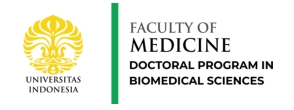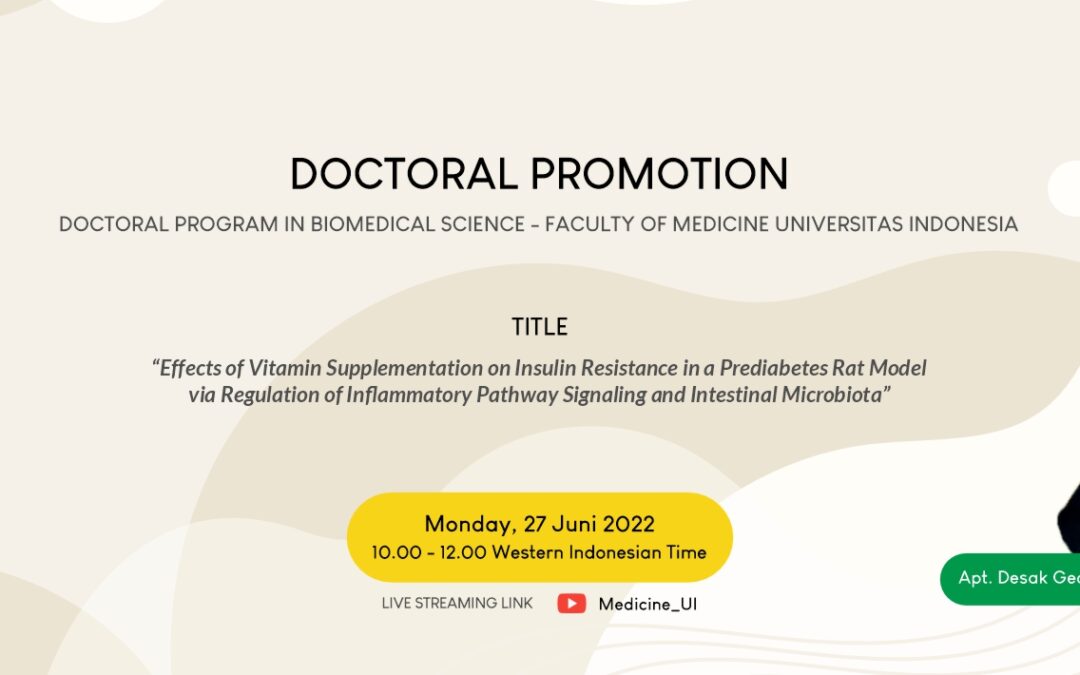Effects of Vitamin Supplementation on Insulin Resistance in Prediabetic Rat Models Through Signaling Regulation of Inflammatory Pathways and Intestinal Microbiota
By: Apt. Desak Gede Budi Krisnamurti, S.Farm., M.Biomed
Diabetes or known to the public as diabetes is a public health problem that is one of the priorities of the four non-communicable diseases that must be addressed immediately because the number of cases in the world has continued to increase over the last few decades. Diabetes cases in Indonesia continue to increase and Indonesia is ranked fifth with the highest number of diabetics in the world. Before becoming diabetes, there is a condition called prediabetes. Prediabetes is a condition when the blood sugar level in a person’s body is more than normal, but not high enough to be categorized as diabetes. Prediabetes will develop type 2 diabetes (DMT2) in approximately 25% of individuals within 3-5 years, and as many as 70% of individuals with prediabetes will develop diabetes in their lifetime. According to Riskesdas 2018, the prevalence of prediabetes is 30.8% of the total population of Indonesia.
Various strategies to prevent diabetes in the prediabetes population have been suggested by experts, but until now they are still not optimal in preventing the worsening of prediabetes to diabetes. Several studies have shown that the lack of vitamin D levels in the blood is associated with the occurrence of type 2 diabetes mellitus. Insulin resistance is caused by many factors, including obesity, high-calorie food intake, low physical activity, and genetic factors.
The incidence of vitamin D deficiency in the world and Indonesia is quite high. In conditions of normal blood vitamin D levels, vitamin D supplementation still plays a role in reducing insulin resistance, but until now the results of this study are still controversial. Studies on vitamin D status in the Indonesian population have not been widely carried out. Several previous studies have shown that vitamin D deficiency is associated with increased insulin resistance and decreased insulin secretion in humans and experimental animals.
This study seeks to answer the role of vitamin D in prediabetes in experimental animals. Prediabetic rats were put on a high-fat, high-sugar diet for 3 weeks, followed by an injection of streptozotocin at the end of the third week. After the prediabetes model was successfully created, the experimental animals were given vitamin D at doses of 100 and 1000 IU/kg/day orally for 12 weeks to be able to provide an overview of the effectiveness of preventing DMT2 in prediabetes conditions through several mechanisms of action. When correlated to human doses, a dose of vitamin D 100 IU/kg BW/day in rats is equivalent to a dose of 800 IU/day in humans, while a vitamin D dose of 1000 IU/kg BW/day in rats is equivalent to a dose of 8000 IU/day in humans. This study proves that giving vitamin D to prediabetic rats can reduce insulin resistance, increase anti-inflammatory cytokines, increase the level of expression of PPARg and IRS1 (a protein that plays a role in reducing insulin resistance), and increase the diversity of microbiota that correlates with the regulation of inflammatory pathway signaling in the body.
Several studies related to vitamin D and its relationship with diabetes mellitus have been carried out previously. The results of these studies are also widely carried out in humans through clinical trials, but give very varied results. Many factors may have influenced the variation in these results, such as genetic differences, body weight, dietary intake related to absorption of vitamin D, different doses, baseline conditions before supplementation, and differences in the duration of administration. The results of this preclinical study provide an overview of the effectiveness of vitamin D supplementation in prediabetes and its molecular mechanisms.
apt. Desak Gede Budi Krisnamurti, S.Farm., M.Biomed has carried out the Doctoral Promotion open examination which was held on Monday, 27 June 2022 at 10.00 – 12.00 and won a Doctorate with Cum Laude predicate and a GPA of 3.98.
YouTube Link
Congratulations Dr. apt. Desak Gede Budi Krisnamurti, S.Farm., M.Biomed

